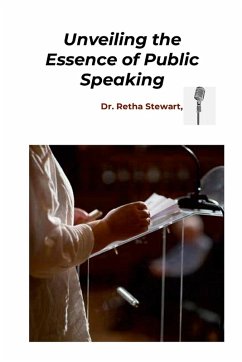
How to Become a Public Speaker
Versandkostenfrei!
Versandfertig in 1-2 Wochen
11,99 €
inkl. MwSt.
Weitere Ausgaben:

PAYBACK Punkte
6 °P sammeln!
ow to Become a Public Speaker by William Pittenger was first published in 1903. It is acclaimed to be the best book on public speaking. There is a widespread opinion that all study of the mode of oratory is unmanly, and leads to the substitution of artifice and adornment for simplicity and power. It is possible to foster a spurious kind of oratory, which shall be far inferior to the rudest genuine speech. The most important question which arises is Can the Art of Speech be learned ? This book addresses this issue. According to William Pittenger, the fundamentals of public speaking are : The In...
ow to Become a Public Speaker by William Pittenger was first published in 1903. It is acclaimed to be the best book on public speaking. There is a widespread opinion that all study of the mode of oratory is unmanly, and leads to the substitution of artifice and adornment for simplicity and power. It is possible to foster a spurious kind of oratory, which shall be far inferior to the rudest genuine speech. The most important question which arises is Can the Art of Speech be learned ? This book addresses this issue. According to William Pittenger, the fundamentals of public speaking are : The Initial fear, Thought and Emotion, Language, Imagination, Voice and Gesture, Confidence, Subject and Object and Thought-Gathering.













